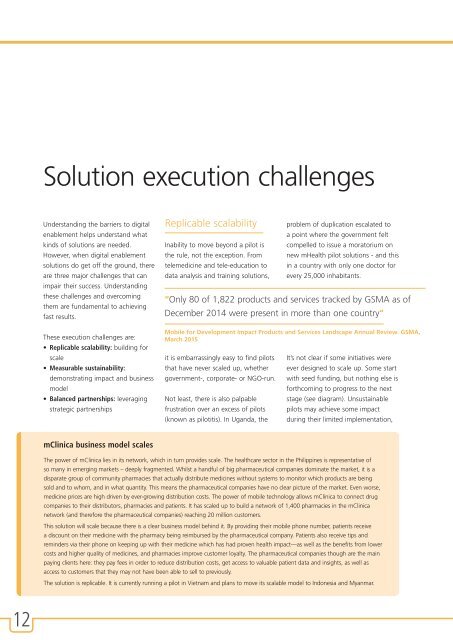Digital Enablement
1ZoIvug
1ZoIvug
You also want an ePaper? Increase the reach of your titles
YUMPU automatically turns print PDFs into web optimized ePapers that Google loves.
Solution execution challenges<br />
Understanding the barriers to digital<br />
enablement helps understand what<br />
kinds of solutions are needed.<br />
However, when digital enablement<br />
solutions do get off the ground, there<br />
are three major challenges that can<br />
impair their success. Understanding<br />
these challenges and overcoming<br />
them are fundamental to achieving<br />
fast results.<br />
These execution challenges are:<br />
• Replicable scalability: building for<br />
scale<br />
• Measurable sustainability:<br />
demonstrating impact and business<br />
model<br />
• Balanced partnerships: leveraging<br />
strategic partnerships<br />
Replicable scalability<br />
Inability to move beyond a pilot is<br />
the rule, not the exception. From<br />
telemedicine and tele-education to<br />
data analysis and training solutions,<br />
it is embarrassingly easy to find pilots<br />
that have never scaled up, whether<br />
government-, corporate- or NGO-run.<br />
Not least, there is also palpable<br />
frustration over an excess of pilots<br />
(known as pilotitis). In Uganda, the<br />
problem of duplication escalated to<br />
a point where the government felt<br />
compelled to issue a moratorium on<br />
new mHealth pilot solutions - and this<br />
in a country with only one doctor for<br />
every 25,000 inhabitants.<br />
“Only 80 of 1,822 products and services tracked by GSMA as of<br />
December 2014 were present in more than one country“<br />
Mobile for Development Impact Products and Services Landscape Annual Review. GSMA,<br />
March 2015<br />
It’s not clear if some initiatives were<br />
ever designed to scale up. Some start<br />
with seed funding, but nothing else is<br />
forthcoming to progress to the next<br />
stage (see diagram). Unsustainable<br />
pilots may achieve some impact<br />
during their limited implementation,<br />
mClinica business model scales<br />
The power of mClinica lies in its network, which in turn provides scale. The healthcare sector in the Philippines is representative of<br />
so many in emerging markets – deeply fragmented. Whilst a handful of big pharmaceutical companies dominate the market, it is a<br />
disparate group of community pharmacies that actually distribute medicines without systems to monitor which products are being<br />
sold and to whom, and in what quantity. This means the pharmaceutical companies have no clear picture of the market. Even worse,<br />
medicine prices are high driven by ever-growing distribution costs. The power of mobile technology allows mClinica to connect drug<br />
companies to their distributors, pharmacies and patients. It has scaled up to build a network of 1,400 pharmacies in the mClinica<br />
network (and therefore the pharmaceutical companies) reaching 20 million customers.<br />
This solution will scale because there is a clear business model behind it. By providing their mobile phone number, patients receive<br />
a discount on their medicine with the pharmacy being reimbursed by the pharmaceutical company. Patients also receive tips and<br />
reminders via their phone on keeping up with their medicine which has had proven health impact—as well as the benefits from lower<br />
costs and higher quality of medicines, and pharmacies improve customer loyalty. The pharmaceutical companies though are the main<br />
paying clients here: they pay fees in order to reduce distribution costs, get access to valuable patient data and insights, as well as<br />
access to customers that they may not have been able to sell to previously.<br />
The solution is replicable. It is currently running a pilot in Vietnam and plans to move its scalable model to Indonesia and Myanmar.<br />
12




